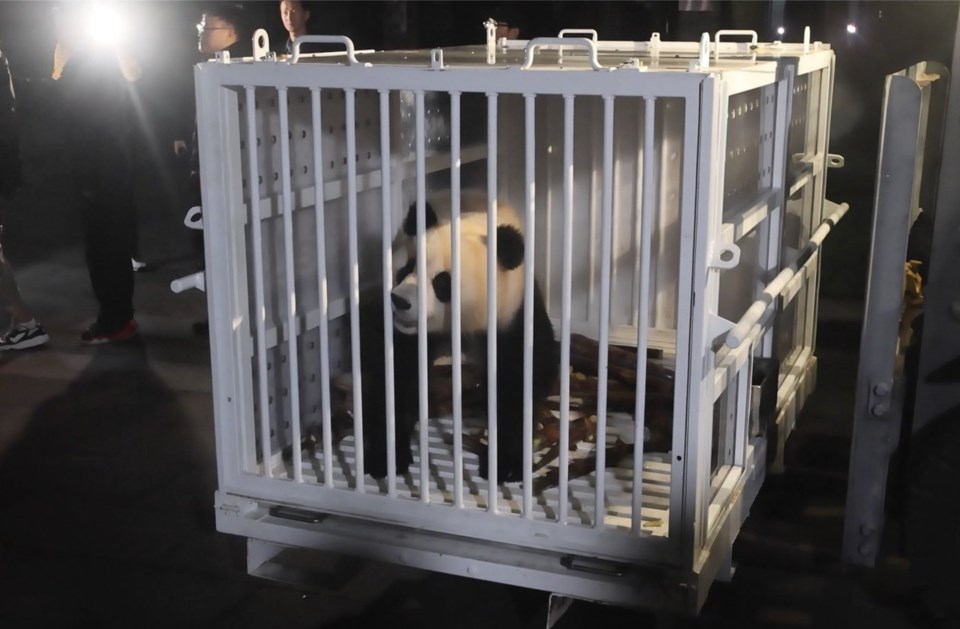WASHINGTON (AP) — The National Zoo's long dark panda drought is coming to an end.
Eleven months after the zoo sent its three wildly popular pandas — Mei Xiang, Tian Tian and their cub Xiao Qi Ji — back to China, a new pair of bears arrived in the United States on Tuesday. They will be transported from Dulles International Airport in suburban Virginia to the zoo.
A pair of three-year old giant pandas, named Bao Li and Qing Bao, have left a research facility in the southwestern Chinese city of Dujiangyan and will soon be flown to Washington, according to a statement by the China Wildlife Conservation Association.
“Food prepared for the trip includes corn bread, bamboo and carrots, as well as water and medicine,” the statement said, adding that the partnership will "make new contributions in protecting global biodiversity and enhance the friendship of the people from the two countries.”
It's unclear exactly when the bears will arrive in Washington, but there will likely be an extended quarantine and acclimation period before they are introduced to the public. On Monday evening, the zoo's website posted an alert that the entire facility would be closed Tuesday, without giving a reason. The lead article on the site still said the pandas would be coming sometime before the end of the year.
Bao Li (precious vigor) and Qing Bao (green treasure) arrive in Washington as part of a new 10-year agreement with Chinese authorities. The previous deal expired last year, leading to some concern among American panda-lovers that Beijing was gradually pulling its furry friendship ambassadors from American zoos amid rising diplomatic tensions.
Breeding pairs in zoos in Memphis and San Diego had already returned to China earlier and the four pandas in the Atlanta zoo left for China last week.
That anxiety turned to optimism last November when Chinese President Xi Jinping publicly stated a desire to continue the panda exchange programs. This year, a new pair of bears has been delivered to the San Diego Zoo, while another pair has been promised to San Francisco.
In Washington, National Zoo officials remained conspicuously silent about negotiations for a new panda agreement, but they expressed optimism about striking a new deal and launched a multimillion-dollar renovation of its panda enclosure in anticipation. Then in late May, zoo director Brandie Smith teamed up with first lady Jill Biden to announce that Bao Li and Qing Bao would be arriving by the end of this year.
The Chinese announcement said the National Zoo had sent “three experienced keepers and veterinary experts” to China to assist the transport and accompany the bears.
Zoo officials on Monday declined to confirm the Chinese announcement. Zoo spokesperson Jennifer Zoon said in an email, “For the safety of animals and staff, we are not able to confirm any details at this time.” But signs at the zoo and on its social media site have heralded the planned return of the pandas and panda-themed merchandise still dominates the gift shops.
“The giant pandas are an iconic part of the Washington, D.C., story, both for locals and incoming travelers alike,” said Elliott L. Ferguson, II, president and CEO of Destination DC. “The interest and excitement associated with their return directly benefits the entire city, bringing further interest and visitors to our hotels, restaurants and other attractions.”
The exact terms of the deal are still unclear; under previous 10-year agreements the Chinese government receives $1 million per year, per bear. Any cubs born in overseas zoos are typically returned to China before they reach age four.
Pandas have become one of the unofficial symbols of the nation's capital, dating back to 1972 when the first pair — Ling Ling and Hsing Hsing — were sent as a gift from Chinese Premier Zhou Enlai following President Richard Nixon's historic diplomatic visit to China. Later, a rolling series of 10-year cooperation agreements was struck.
Liu Pengyu, a spokesperson for the Chinese embassy in Washington, credited the decades of cooperation with advancing research into panda preservation and breeding. During the lifespan of these agreements, giant pandas have been reclassified from an endangered species to merely vulnerable.
“The current round of cooperation will focus on prevention and treatment of major diseases, and protection of habitats and wild giant panda populations,” Liu said in an email. “We hope the arrival of the pandas will inject fresh impetus into exchanges between China and the U.S., and help to stabilize the broader bilateral relationship as well.”
Ashraf Khalil And Didi Tang, The Associated Press




